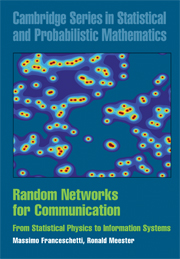3 - Connectivity of finite networks
Published online by Cambridge University Press: 12 December 2009
Summary
One of the motivations to study random networks on the infinite plane has been the possibility of observing sharp transitions in their behaviour. We now discuss the asymptotic behaviour of sequences of finite random networks that grow larger in size. Of course, one expects that the sharp transitions that we observe on the infinite plane are a good indication of the limiting behaviour of such sequences, and we shall see to what extent this intuition is correct and can be made rigorous.
In general, asymptotic properties of networks are of interest because real systems are of finite size and one wants to discover the correct scaling laws that govern their behaviour. This means discovering how the system is likely to behave as its size increases.
We point out that there are two equivalent scalings that produce networks of a growing number of nodes: one can either keep the area where the network is observed fixed, and increase the density of the nodes to infinity; or one can keep the density constant and increase the area of interest to infinity. Although the two cases above can describe different practical scenarios, by appropriate scaling of the distance lengths, they can be viewed as the same network realisation, so that all results given in this chapter apply to both scenarios.
Preliminaries: modes of convergence and Poisson approximation
We make frequent use of a powerful tool, the Chen–Stein method, to estimate convergence to a Poisson distribution. This method is named after work of Chen (1975) and Stein (1978) and is the subject of the monograph by Barbour, Holst and Janson (1992).
- Type
- Chapter
- Information
- Random Networks for CommunicationFrom Statistical Physics to Information Systems, pp. 69 - 99Publisher: Cambridge University PressPrint publication year: 2008

